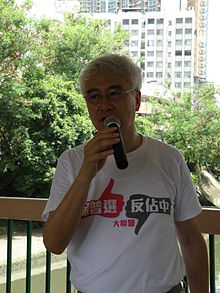
The 2007 Hong Kong District Council elections were held on 18 November 2007. Elections were held to all 18 districts of Hong Kong, returned 405 members from directly elected constituencies out of total 534 councils member. A total number of 886 candidates contesting in 364 seats, while 41 seats were uncontested. A total number of 1.4 million voters cast their ballots, consisting 38% of the electorate, significantly lower than the last elections in 2003.

Moral and national education (MNE), initially known as Moral and civic education (MCE), was a school curriculum proposed by the Education Bureau of Hong Kong in 2012.

Occupy Central with Love and Peace (OCLP) was a single-purpose Hong Kong civil disobedience campaign initiated by Reverend Chu Yiu-ming, Benny Tai and Chan Kin-man on 27 March 2013. The campaign was launched on 24 September 2014, partially leading to the 2014 Hong Kong protests. According to its manifesto, the campaign advocates for an electoral system in Hong Kong that is decided through a democratic process and satisfies international standards of universal and equal suffrage. With the first three stages of the movement – dialogue, deliberation and citizens' authorization – the civil disobedience that follows must be non-violent.
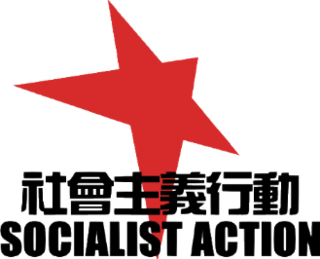
Socialist Action is a Trotskyist political organisation in Hong Kong. It is affiliated with International Socialist Alternative (ISA) and works closely with the ISA sections in China and Taiwan. It describes itself as being based on the method and analysis of Marxism, to politically re-arm and organise the working class in the fight for a socialist world. They oppose the Chinese Communist Party, which they claim has made China the 'Sweatshop of the World' with one of the most extreme wealth gaps on the planet. They stand for the creation of fighting independent trade unions by Chinese workers to fight against capitalist exploitation and authoritarian rule.

The Silent Majority for Hong Kong is an anti-Occupy Central pro-Beijing political group in Hong Kong. It was founded on 8 August 2013 by members of the pro-Beijing alliance including former RTHK radio host Robert Chow and Professor of Economics at Lingnan University Ho Lok-sang.

The 2016 Hong Kong Legislative Council election was held on 4 September 2016 for the 6th Legislative Council of Hong Kong (LegCo). A total of 70 members, 35 from geographical constituencies (GCs) and 35 from functional constituencies (FCs), were returned. The election came after the rejection of the 2016/2017 constitutional reform proposals which suggested the electoral method for the 2016 Legislative Council remains unchanged.
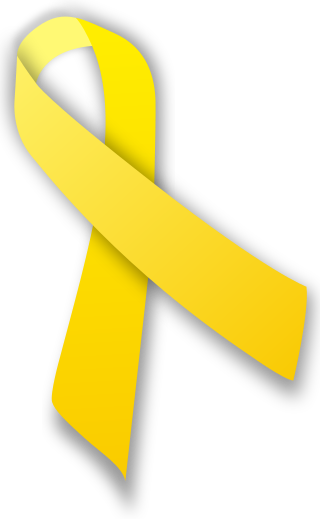
The 2014 Hong Kong class boycott campaign, also known as 922 Class Boycott and 926 Class Boycott, is a student strike protesting the PRC Standing Committee of the National People's Congress's restriction on nomination system of the election of the Chief Executive in the 2016 and 2017 Hong Kong Political Reform. The campaign, jointly organised by the Hong Kong Federation of Students and Scholarism, was participated in by university students from 22 to 26 September and later also by secondary school students on 26 September. The student movement evolved into the 2014 Hong Kong protests in which several regions across the Victoria Harbour were occupied by pro-democracy protesters.

A series of sit-in street protests, often called the Umbrella Revolution and sometimes used interchangeably with Umbrella Movement, or Occupy Movement, occurred in Hong Kong from 26 September to 15 December 2014.

The Umbrella Movement was a political movement that emerged during the 2014 Hong Kong protests. Its name arose from the use of umbrellas as a tool for passive resistance to the Hong Kong Police's use of pepper spray to disperse the crowd during a 79-day occupation of the city demanding more transparent elections, which was sparked by the decision of the Standing Committee of the National People's Congress of the People's Republic of China (NPCSC) of 31 August 2014 that prescribed a selective pre-screening of candidates for the 2017 election of Hong Kong's chief executive.

Alex Chow Yong-kang is a social activist from Hong Kong and current doctoral candidate in geography at the University of California, Berkeley. He is a former secretary-general of the Hong Kong Federation of Students and a former Vice-President (External) of the Hong Kong University Students' Union.

The East Wing Forecourt of the Central Government Office, or Civic Square, is an open space in front of the East Wing of the Central Government Complex, Hong Kong, which is located in Tamar. It was once an area where protesters took part in protests and demonstrations. It was closed in July 2014, and reopened on 10 September 2014. For many, it represents democracy and freedom, and a place to express their discontent. It was occupied for a rally opposing the moral and national education school curriculum proposal in August 2012, and during the 2014 Hong Kong protests in September 2014. Since then, the square is closed by the government in order to prevent protests.

Leticia Lee See-yin was an outspoken pro-Beijing figure in Hong Kong. She held several positions at various political and activist organisations in Hong Kong.
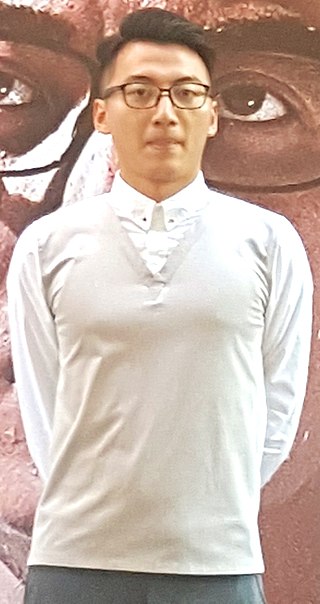
Alvin Cheng Kam-mun, also known as "Brother Four Eyes", is a Hong Kong political activist, a member of Civic Passion, and founder of student activist organization Student Front. In 2014, he led a rally in support of the Hong Kong Umbrella Movement during the G20 Brisbane summit.

Ryan Lau Hok Ming is a Hong Kong professional footballer who currently plays as a centre back for Hong Kong Premier League club Southern.
The election for the Hong Kong deputies to the 13th National People's Congress (NPC) was held on 19 December 2017. 36 Hong Kong deputies were elected by an electoral college composed of 1,989 members.

"Liberate Hong Kong, revolution of our times" is a slogan used by social movements in Hong Kong. The slogan was first used in 2016 by Hong Kong Indigenous spokesman Edward Leung as his campaign theme and slogan for the 2016 New Territories East by-election. He emphasised that anyone could take part in innovation and change regardless of age, hence the use of the phrase "revolution of our times". In the legislative election held later that year, Youngspiration, which was cooperating with Hong Kong Indigenous as Leung was banned from running by the Electoral Affairs Commission, also used the slogan for their campaign.

Tsz Wan Shan Constructive Power was a local political group based in Tsz Wan Shan of Wong Tai Sin District founded in January 2015 by a group of HKGolden netizens. Inspired by the Umbrella Revolution, the group contested in the 2015 District Council election but failed to win any seats. It won two seats in a historic pro-democracy landslide in 2019 District Council election.
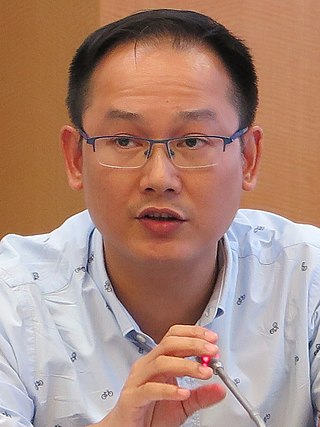
Chan Hok-Fung is a Pro-Beijing DAB Hong Kong politician who was a member of Central and Western District Council, and was once the vice-chairman of the council, until losing re-election in the 2019 Hong Kong local elections.
The written traditional Chinese characters for vertical banners are "直幡", and the horizontal counterpart, horizontal banners, are written as "横額" in traditional Chinese. This article focuses on the use of vertical banners as protest banners in Hong Kong.

